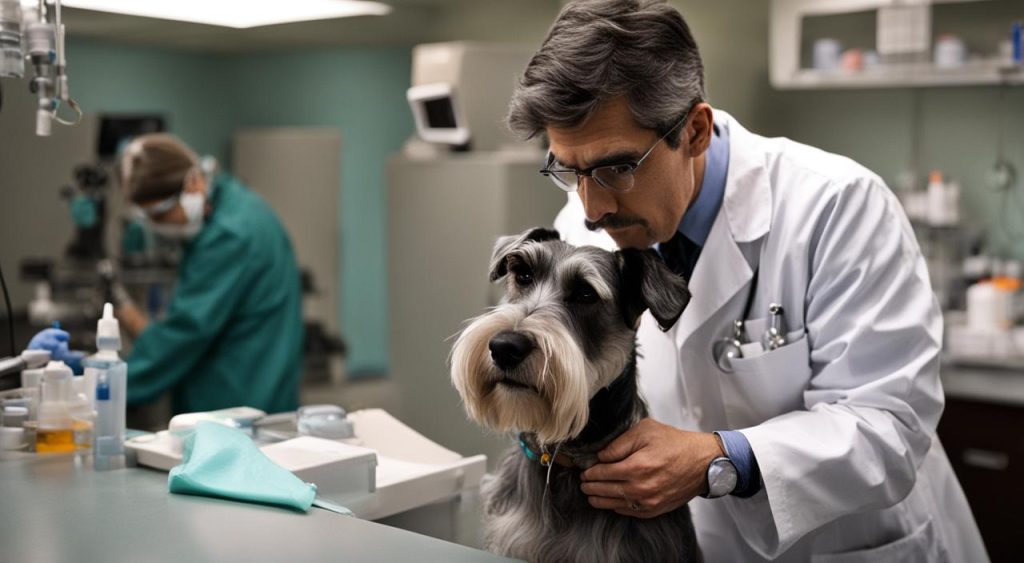Miniature Schnauzers, the smallest of the three Schnauzer breeds, are known for their outgoing and friendly personalities. However, as a purebred dog breed, they are more prone to certain genetic health problems. It is important for Mini Schnauzer owners to be aware of these potential health risks and work closely with their veterinarians to monitor and treat any medical conditions that may arise.
Key Takeaways:
- Miniature Schnauzers are prone to genetic health problems due to their purebred status.
- The most common health issues in Mini Schnauzers include diabetes, liver problems, hemorrhagic gastroenteritis, bladder or kidney stones, and skin allergies or diseases.
- Regular veterinary check-ups and proper care are crucial for Miniature Schnauzer health.
- Pet insurance can help cover the costs of chronic conditions like diabetes.
- With proper healthcare, Mini Schnauzers can live a long and happy life.
Common Mini Schnauzer Health Problems
Miniature Schnauzers are prone to several common health problems that owners should be aware of. These health concerns can impact the overall well-being of your Mini Schnauzer and require proper care and attention.
Diabetes
One of the most common health issues in Mini Schnauzers is diabetes. This condition occurs in Miniature Schnauzers at a higher rate compared to many other dog breeds. Dogs with diabetes require daily insulin injections to manage their condition and regulate their blood sugar levels.
Liver Problems
Liver problems, such as portosystemic shunt (PSS), are more prevalent in Miniature Schnauzers. PSS is a condition where abnormal blood flow bypasses the liver, leading to various health issues. Early detection and proper treatment are crucial to managing liver problems in Mini Schnauzers.
Hemorrhagic Gastroenteritis
Another health concern in Miniature Schnauzers is hemorrhagic gastroenteritis. This condition is characterized by severe vomiting and bloody diarrhea, which can lead to dehydration and other complications if left untreated. Prompt veterinary care is necessary to manage this potentially life-threatening condition.
Bladder or Kidney Stones
Mini Schnauzers are more prone to developing bladder or kidney stones, particularly calcium stones. Female Miniature Schnauzers and older dogs are at a higher risk. These stones can cause painful urination, discomfort, and potential blockages, requiring veterinary intervention for proper treatment.
Skin Allergies and Diseases
Miniature Schnauzers are also susceptible to various skin allergies and diseases. Skin allergies can cause itching, redness, and discomfort for your dog. Follicular dermatitis is a common condition that affects Mini Schnauzers, leading to hair loss, inflammation, and skin infections.
By recognizing these common health problems in Miniature Schnauzers, you can take proactive steps to ensure the well-being and longevity of your beloved pet. Regular veterinary check-ups, a balanced diet, exercise, and proper grooming can help minimize the impact of these health concerns and provide your Mini Schnauzer with a healthier and happier life.
Mini Schnauzer Health Outlook and Care
Despite their health issues, Mini Schnauzers can live a long and happy life with proper healthcare and veterinary care. The average lifespan of Miniature Schnauzers is 12 to 15 years, compared to 13 to 16 years for Standard Schnauzers. This means that with the right care, you can enjoy many memorable years with your Mini Schnauzer companion.
One of the advantages of Miniature Schnauzers is that they are low-shedding dogs, making them suitable for families with allergies or those who prefer a cleaner home environment. Their minimal shedding also means less time spent on grooming and cleaning up after them.
To ensure the well-being of your Mini Schnauzer, it’s important to invest in pet insurance. This can help cover the costs of any potential chronic conditions such as diabetes, which is more common in this breed. Regular visits to the veterinarian for check-ups, vaccinations, and preventive care are also essential for maintaining your Mini Schnauzer’s health.
In addition to regular vet visits, providing your Miniature Schnauzer with a balanced and nutritious diet is crucial. Consult with your veterinarian to determine the best diet for your dog’s specific needs. Regular exercise, such as daily walks and playtime, will help keep your Mini Schnauzer physically and mentally stimulated.
Caring for a Mini Schnauzer’s health requires a holistic approach, including grooming practices. Regular brushing will help maintain a healthy coat. Trimming their nails, cleaning their ears, and regularly brushing their teeth are also essential parts of their grooming routine.
With proper care and attention, Mini Schnauzers can be wonderful companions, bringing joy and happiness to your life for many years to come.





